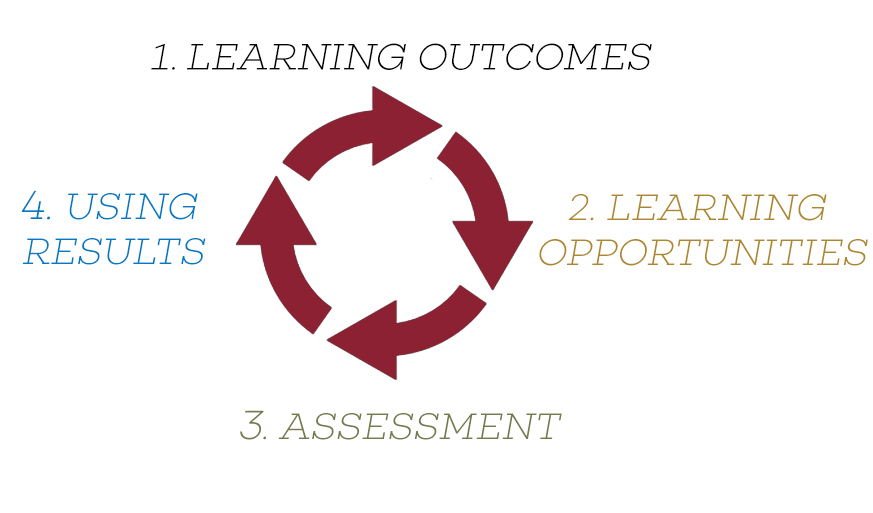Assessment resources encompass information or training provided to faculty and staff to help them understand, develop, implement, communicate, and use evidence of student learning.
The Assessment Cycle

1. Learning Outcomes
Good assessment begins with well-defined and clearly articulated learning outcomes. The video above walks you through how to develop strong program-level learning outcomes.
In addition, the Middle State Commission's handbook on Student Learning Assessment contains useful information on developing learning outcomes that describe what we want students to learn.
View the handbook Student Learning Assessment: Options and Resources »
2. Learning Opportunities
Programs must assure that students have ample opportunities to achieve defined learning outcomes. Curriculum maps graphically depictwhich courses address particular student learning outcomes for a specific program. Curriculum maps are a rich source of information; for example, they help programs identify student learning outcomes that are not being addressed, highlight courses that are not connected to any particular student learning outcome and/or determine course assignments that could be used as an embedded assessment, such as capstone course assignments.
3. Assessment
Assessment of student learning is deciding what we want our students to learn and making sure they learn it. Understanding the difference between the types of evidence derived from assessment is necessary in order to develop the most appropriate assessment to measure your program's Student Learning Outcomes, and is the focus of the video Understanding Direct and Indirect Assessment.
4. Using Results
Understanding and using assessment to improve teaching and learning is the ultimate goal of assessment. The video below includes information on how to use assessment results for program improvement.
Knowing your audience is critical in assessment planning. What are you being asked to do? Who will be using the results? Who will be interested in the results? Campus audiences might include: program faculty, faculty in affiliated programs, institutional leaders and/or program administrators and staff. Public audiences include prospective students and their families, employers and policy makers, among others.
Assessment can point to needed improvements. Does the curriculum address each learning goal? Are we using appropriate methods of instruction? Are courses taken in the proper sequence? Do students have the necessary foundation built in pre-requisites for advanced courses? Are there gaps in coverage? Can you improve the learning goals? Are there too many goals? Do the goals need to be clarified? Are the goals inappropriate or overly ambitious?
Assessment can identify need to enhance support programs such as: tutoring, library services, academic advising, counseling, technology infrastructure and co-curricular opportunities.
Consider the need to improve assessments. Are the assessments poorly written or misinterpreted? Does the type of assessment match the learning goals? Are the assessments too easy or difficult? Are the benefits of the assessment worth the resources invested?
Showcase your results. Consider sharing your results at assessment committee meetings, department/school meetings, annual assessment events or at conferences. Share highlights and pleasant surprises but also address areas for improvement. Get feedback about next steps.
Additional Resources
Middle States Standards
Temple University is proud to be accredited by the Middle States Commission on Higher Education (MSCHE). Temple uses the MSCHE standards as guides for optimal growth as the university strives toward future successes that will be even greater than Temple's celebrated present accomplishments.
For a full explanation and requirements of each standard, read the MSCHE publication, Standards for Accreditation and Requirements of Affiliation.
Center for the Advancement of Teaching
The Center for the Advancement of Teaching promotes the value and practice of excellent teaching, teaching that facilitates student learning and growth. They also provide opportunities for faculty and TAs to reflect on their work, and to share, and learn, from the experience and expertise of their colleagues. By supporting faculty in their work as teachers, their aim is to support the success of Temple's student body and the development of Temple students as scholars and citizens.
Visit the Center for the Advancement of Teaching site »
Other Online Resources
Other higher education institutions and organizations have assembled collections of online assessment resources worth sharing.
